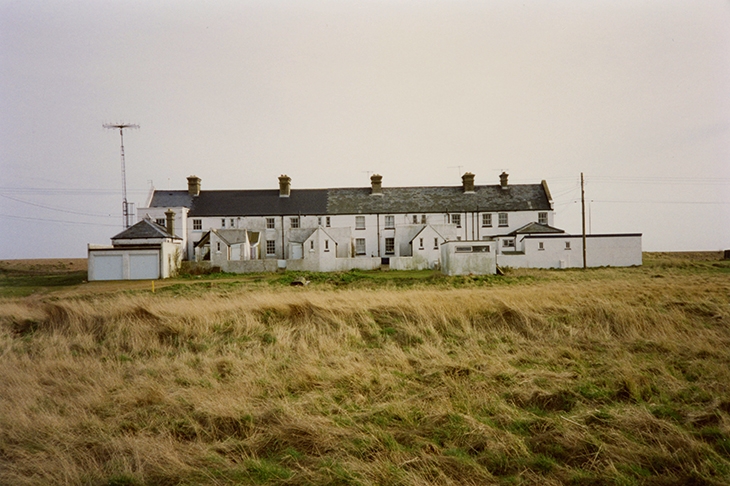East Anglia, the rump of the British Isles, has inspired a disproportionate number of writers: Robert Macfarlane, Daisy Johnson, Mark Cocker, Sarah Perry, to name but a few. Towering over them all is the ghost of a soft-spoken man with a shoe-brush moustache and sardonic eyes. Eighteen years after his death, W.G. Sebald’s reputation only grows. Few writers have inspired the commemoration industry Sebald has given life to while still so recently claimed by the past tense.
Before he was killed in a car accident in 2001 at the age of 57, Winfried Georg Maximilian Sebald enjoyed several years of fame as a writer of what he called ‘prose fiction’ — books that drew on fiction, memoir, travelogue and essay to create hybrid works unified as much by tone (sepulchral, anxious) as form. For 31 years Sebald taught European literature at the University of East Anglia, where I also teach. His untimely death haunts us still. He is present in the concrete corridors of the building where I write this now: the Teaching Wall (as it is known locally), the monumental concrete structure designed by Denys Lasdun that zigzags through the ex-pasture on which UEA’s campus was plonked in the early 1960s.
I did not know Sebald personally, although for a while I inhabited his former office in the Wall, and the room where the PhD programme I direct holds its classes is the Max Sebald Room. Here, two portraits stare down at us amid the drapery cast by tall Scots pines outside the window: one is a rendition of Max, his intense stare intact against a verdigris background, the other is Gisèle Freund’s famous photograph of Walter Benjamin — an apt duo of patron saints. Like Benjamin, Sebald has become something of a commuting spirit for the mash-up of creative-critical writing that flourishes in universities, as well as a gold standard for analysing the relationship between images and text. He has been admitted to the thin coterie of writers whose names are used adjectivally, although for me at least ‘Sebaldian’ signifies not so much a style as a state of mind.
I have long been interested in the relationship between image and text and have taught a creative writing course in which students combine photography and prose using Sebald’s books as exemplars. This month, two exhibitions in Norwich and a symposium that looks at the relationship between visuals and text in his work mark what would have been Sebald’s 75th birthday. Lines of Sight: W.G. Sebald’s East Anglia focuses on photographs from Sebald’s research for his 1995 book Rings of Saturn. A separate exhibition at the Sainsbury Centre for Visual Arts at UEA, W.G. Sebald: Far Away —But From Where?, presents photographs from his research for his novels Vertigo (1990) and the final major work to be published in his lifetime, Austerlitz (2001), as well as works by three artists inspired by Sebald’s writing, including a 28-minute film by Tacita Dean. In the same week, a symposium gathers translators at UEA to consider the relationship between image, text and translation in his works.
I understand the impulse behind this hagiography, although one wonders what the modest professor who remained wedded to his damp Norfolk rectory amid growing international fame would have made of all the attention. As with his signature collusion of fiction and memoir, Sebald called his use of images ‘quasi-documentary’. Excised from his texts they display more fully their strange dogged glamour, confronting us with ‘the uncanny ache that cries out from the silence of solid things’, as Cynthia Ozick wrote in a review of Sebald’s first publication in English, The Emigrants.
What is striking is Sebald’s evolution as a photographer; you can clearly see his work becoming more confident in subject and composition. He started out taking (by his own admission) amateurish snapshots to record his research trips around Europe and England for his books. The tropes present in his texts — of rail stations, gardens and gazebos, of curiously fragile, de-peopled towns and cities — are all duly represented in prints made from his film camera.
Sebald was much more hands-on with the presentation and placement of his images than I’d realised. He worked with UEA’s photographer at the time, Michael Brandon-Jones, to make blurry colour photographs into compelling half-tones in a pre-Instagram-filtered world, producing analogue Ginghams and Inkwells. They may have started off as documentary aide-mémoires, but they anticipate the age of the edgeland, imbuing mute ex-industrial spaces and giant train termini with an enigmatic dynamism.
For me, the most compelling photographs are those of East Anglia, to whose landscape he seems to have had a psychic connection. He captures the isosceles relationship between horizon and sky; wind-blown dwellings, shaggy and stricken as Shackleton’s Antarctic ponies, line cursive shorelines and uncharismatic fields. As a portrait of edgeland his photographs surpass their content, perhaps because we are reading them backwards, as it were, with hindsight of their author’s foreshortened life. They now appear historic; they invite the viewer to reflect on how visual culture, the material production of images and also the urban and rural landscapes Sebald frequented have been transformed.
It was Walter Benjamin who wrote that we remember not so much through words as in images. The gambit of both exhibitions is to look behind the curtain of the writer’s process via his photographs, perhaps to present them as evidence for Sebald’s serpentine narratives. These are mementoes, yes, but also counterfactual evidence — a description of which Sebald might have approved.
The Sebald mystique lives on. ‘I want to study at the university where W.G. Sebald conceived and wrote his masterpieces,’ write countless applicants to our prestigious MA in Creative Writing Prose Fiction. He is everywhere, he has never gone away. In his afterlife, Sebald, a writer haunted by the cataclysms of the 20th century, has become the haunter, an ever-present, evanescent ghost.






Comments